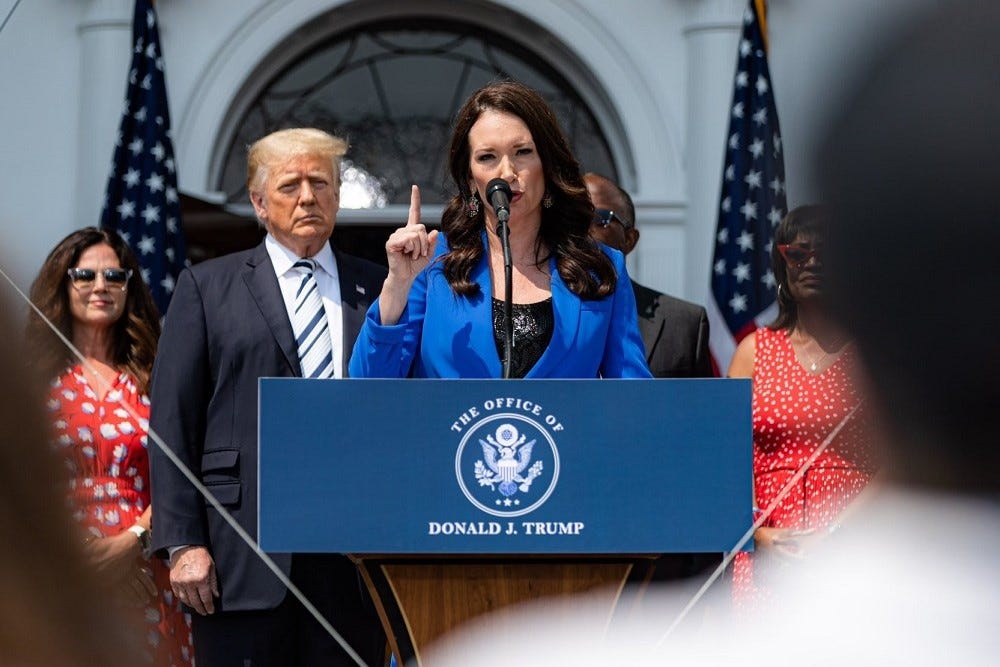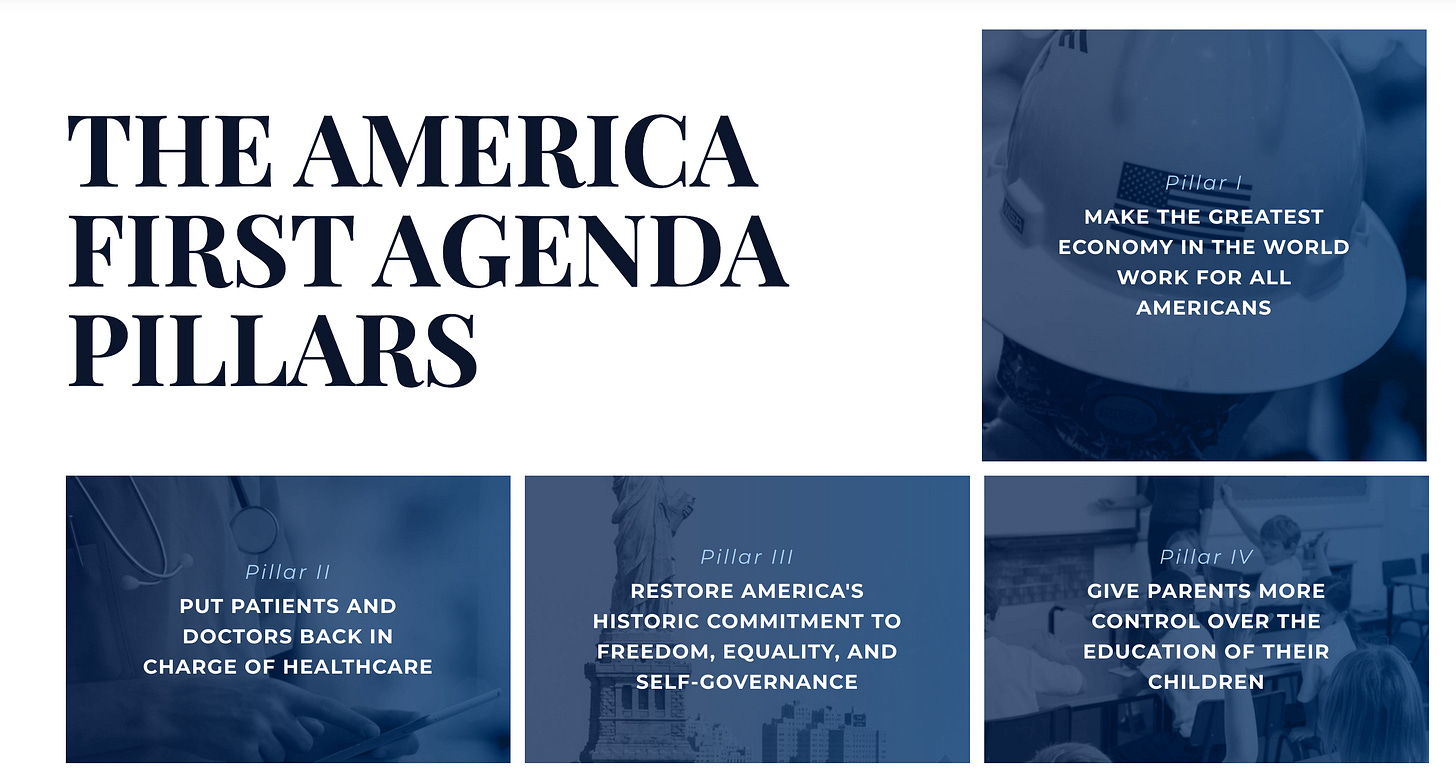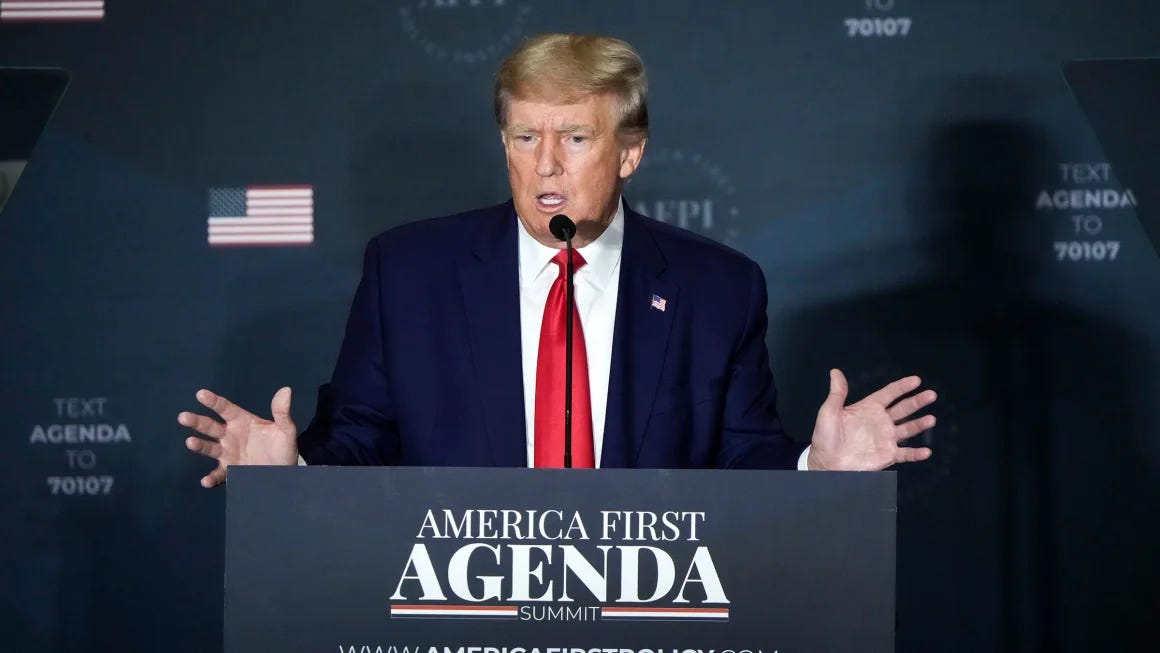The Little-Known Group Shaping Trump's Agenda
...And no, it's not the authors of Project 2025
Today’s post is written by Isaac Saul, Founder and Executive Editor of Tangle News.
You’ve heard of Project 2025, the Heritage Foundation’s detailed playbook for how to overhaul the executive branch and pursue a vast array of conservative policies — but the effort was mired in controversy and ultimately disavowed by Trump himself.
But a lesser known group with deep ties to the president-elect is emerging as a key player in his transition. Talk to any reporter covering Trump, and they’ll probably mention the America First Policy Institute (AFPI), a think tank with its own distinct goals for governance in 2025 and beyond.
As Trump prepares to assume office, the AFPI is angling to play a significant role in shaping his policy aims and priorities. So today, let’s dive into the backstory of the AFPI, what it seeks to achieve, and how it could factor into the next four years.
What is it?
The AFPI is a 501(c)(3) nonprofit think tank whose mission is to promote a conservative agenda for the United States, particularly in policy areas like the military, foreign policy, and energy. As its name suggests, the group broadly advocates for “America first” policies — typically associated with Trump’s political movement — prioritizing the United States’s domestic interests over engagement in global coalitions and foreign affairs.
Brooke Rollins and Larry Kudlow, both alumni of the first Trump administration, founded the AFPI in 2021. During Trump’s term, Rollins served as director of the Domestic Policy Council and assistant to the president for strategic initiatives, while Kudlow served as director of the National Economic Council. The AFPI’s leadership also includes several other Trump administration figures, and 11 cabinet nominees for Trump’s second term have ties to the organization.
The AFPI launched with a 35-person team and a first-year budget of $20 million. By 2023, it said it had grown to over 135 employees and increased its operating budget to $25 million, though it does not disclose its funding sources.
Its core functions range from analyzing and critiquing policy, to drafting proposals, to political advocacy, all of which are outlined in the group’s “America First Agenda.” Although the AFPI does not explicitly align itself with President-elect Trump, it is sometimes described as a “White House in waiting” for allies of the president-elect hoping to influence his next term.
What is it trying to do?
Fundamentally, the AFPI seeks to guide the policy focus of the Trump administration. It has outlined its broad goals in a presidential transition document — similar to Project 2025 — which includes input on a range of policy proposals from roughly 400 former senior government leaders. The plan is focused on three key areas:
Process — Implementing the president’s agenda “faster and more effectively than any administration in history.”
Policy — Developing executive and legislative actions “ready to be executed quickly.”
Personnel — Training personnel for the incoming administration to “ensure it can field a bigger, more qualified, and loyal team on Day One.”
If these focus areas sound similar to Project 2025’s “pillars,” that’s because they are. However, the president-elect has signaled explicit support for the AFPI, delivering the keynote address at its 2022 America First Agenda Summit and bringing on its chair, Linda McMahon (now Trump’s nominee to lead the Department of Education), as co-chair of his 2024 transition team.
Both Trump and the AFPI have downplayed the extent of their relationship, but the group is widely viewed as holding sway in Trump’s orbit, particularly as it relates to his White House transition (last April, Rollins said the AFPI had prepared drafts of 298 executive orders for “the next president.”)
One of its most prominent ideas exemplifies how it aims to change the federal government in the next four years, and it involves eliminating civil service protections for government employees.
The 1883 Pendleton Act made it illegal to fire or demote many federal employees for political reasons and has long protected civil servants from losing their jobs when a new president assumes power. The AFPI, however, seeks to undo most of those protections. Here’s how The New York Times’s Ken Bensinger described that plan in an interview with NPR last fall:
Perhaps [the AFPI’s] most aggressive idea for a policy in a new Republican administration is this concept of turning federal career employees into at-will hires. What that means is that they would lose a lot of the protections, if not all the protections that they have… that are supposed to shield them from political influence, that are supposed to protect them and allow them to do their job in a way that is not political, that is supposed to be neutral and unbiased. Currently, most federal employees, of which there are several million, are unionized, and it's quite an elaborate process to discipline and dismiss them. And if the institute had its way… all of these would instantly be the same as an employee, for example, at a Walmart or at a private institution, where they don't have a contract. They don't have a union to protect them, and they can be dismissed basically for any reason.
Again, this proposal shares many similarities with Project 2025’s playbook, but the AFPI’s close ties with President-elect Trump give it the inside track to influence this effort in his administration.
What clues does it give for what’s to come over the next 4 years?
The AFPI is fairly explicit in its goals for the next administration. The group outlines ten pillars comprising its “America First Agenda.” The pillars are:
Make the greatest economy in the world work for all Americans
Put patients and doctors back in charge of healthcare
Restore America's historic commitment to freedom, equality, and self-governance
Give parents more control over the education of their children
Secure the border, end human trafficking, and defeat the drug cartels
Deliver peace through strength and American leadership
Make America energy independent
Make it easy to vote and hard to cheat
Provide safe and secure communities so all Americans can live their lives in peace
Fight government corruption by draining the swamp
Each pillar contains chapters that hone in on a specific policy area or proposal. Take Pillar #4 on parents and education. The first chapter makes the case for expanded school choice (in which taxpayer money is given to a private school–religious or otherwise–in the form of a voucher) to “increase competition among providers, reduce opportunity gaps for our more vulnerable students, and improve the quality of education for all children.”
Another chapter calls for federal funding to improve financial literacy instruction and digital literacy in schools — not too controversial. The final chapter, however, is much more provocatively titled, “Advocate for Teaching the Truth About America’s History.”
This section takes aim at perceived “radical political advocacy” in schools, and says that, “instead of promoting inaccurate and unpatriotic concepts, our schools should teach the true story about our Nation’s incredible yet imperfect history. When our students are taught the truth about our Nation’s founding, they will be proud to be Americans and will have a greater appreciation for their freedoms and the importance of defending them.”
If enacted, these policies would obviously impact different people in different ways. Parents seeking more educational options may find value in the school choice plan, while critics express concerns over its impact on public education. Some might also agree that curricula have become too political and back a plan to revisit how certain subjects are taught, while others see such proposals as an attempt to indoctrinate kids with a different brand of political propaganda.
While no one can know how their advocacy will pan out, I’d advise against despondency if you’re someone who opposes their ideas. The AFPI and the Trump administration undoubtedly share many values and goals, but think tanks lobbying for their preferred positions is nothing new and has been a feature of every administration in recent memory. What you should focus on — as a citizen and political observer, and whether you voted for Trump or not — is the actual policies that lawmakers pursue once in power.
My suspicion is that even with control of the White House and Congress, Republicans won’t be interested in the most radical ideas outlined by the AFPI and other conservative think tanks.
Over the summer, I wrote a deep dive on Project 2025, and I think my conclusions about that effort hold true for the AFPI’s America First Agenda. I’ll leave you with one passage as a closing thought:
Liberals should think about Project 2025 the same way conservatives should think about a more leftist policy proposal like the Green New Deal: It’s an aspirational policy framework led by the most ardent ideologues on one side of the aisle, and it’s one that contains a mix of good ideas, bad ideas, and unrealistic proposals that won’t ever see the light of day. And if you are on the other side of the aisle from the drafters of these proposals, I think it’s totally fair to focus on those bad ideas and be concerned about them. But my advice is not to fall for the hysteria.
Isaac Saul is the founder and executive editor of Tangle News, an independent, nonpartisan news outlet focused on sharing perspectives from across the political spectrum about one big story each day. It’s free to sign up, and you can check it out here.








It’s hard to not feel despondent about it when you live in a state actively trying to do things to public education you don’t feel is good for the community. In Texas they just approved reading curriculum that’s included Bible lessons in it and to encourage districts to use it they tied funding to adopting it. Which is a big deal considering the legislature hasn’t given any increase in funding as the governor is adamant to pass vouchers.
Actions speak louder than words. For example, in Agenda item #2 “Put patients and doctors back in charge of healthcare”, we’ve seen how the GOP has stripped the rights of a pregnant person’s ability to make informed decisions in collaboration with a trusted healthcare provider. In item #4, we can read between the lines and see this refers to school vouchers which will rip away at the fabric of our public school system.
The AFPI agenda serves their White Christian Nationalist worldview 😢